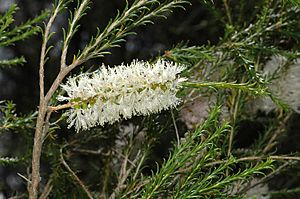Melaleuca hamulosa facts for kids
Quick facts for kids Melaleuca hamulosa |
|
|---|---|
 |
|
| Scientific classification |
|
| Kingdom: | Plantae |
| Clade: | Tracheophytes |
| Clade: | Angiosperms |
| Clade: | Eudicots |
| Clade: | Rosids |
| Order: | Myrtales |
| Family: | Myrtaceae |
| Genus: | Melaleuca |
| Species: |
M. hamulosa
|
| Binomial name | |
| Melaleuca hamulosa |
|
| Script error: The function "autoWithCaption" does not exist. | |
Script error: No such module "Check for conflicting parameters".
Melaleuca hamulosa is a cool plant that belongs to the myrtle family, called Myrtaceae. You can only find it growing naturally in the south-west part of Western Australia. It looks a bit like a broom, with lots of stiff branches that grow upwards. In spring or summer, it blooms with spikes of white or light purple flowers.
What Does It Look Like?
Melaleuca hamulosa is a thick, bushy shrub or a small tree. It usually grows to about 4 meters (13 feet) tall, but sometimes it can reach up to 7 meters (23 feet). It has bark that feels like tough fibers or thin paper.
Its leaves grow in a special way, one after the other around the stem. They are usually pressed close to the stem. These leaves are about 3.5 to 11 millimeters (0.14 to 0.43 inches) long and 0.6 to 1.0 millimeter (0.02 to 0.04 inches) wide. They are long and thin, almost round, and have a little hook at the very end.
The flowers are white, light purple, or pink. They grow in spikes that have between 30 and 60 individual flowers. These spikes can be up to 50 millimeters (2 inches) long and 15 millimeters (0.6 inches) wide. The plant flowers between September and February. After the flowers, it grows small, round, woody fruits called capsules. These capsules are about 2 to 3 millimeters (0.08 to 0.12 inches) long and grow in clusters up to 50 millimeters (2 inches) long.
How It Got Its Name
This plant was first officially described in 1847 by a Russian botanist named Nikolai Turczaninow. He wrote about it in a science journal.
The plant's scientific name, hamulosa, comes from the Latin word hamus. This word means "a hook." This name was chosen because the leaves of this plant have a small, hooked tip.
Where Does It Grow?
Melaleuca hamulosa grows in several areas of Western Australia. These areas include the Avon Wheatbelt, Coolgardie, Esperance Plains, Geraldton Sandplains, Jarrah Forest, Mallee, and Yalgoo regions.
It likes to grow in sandy soils, often over clay, in places that get wet in winter, like swamps or low areas. You can often find it in areas of kwongan, which is a type of shrubland with many different plants.
Is It Endangered?
The Government of Western Australia's Department of Parks and Wildlife has looked at Melaleuca hamulosa. They have listed it as "not threatened," which means it is not currently in danger of disappearing.

